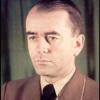Albert Speer

Albert Speer
Berthold Konrad Hermann Albert Speer; March 19, 1905 – September 1, 1981) was a German architect who was, for most of World War II, Minister of Armaments and War Production for Nazi Germany. Speer was Adolf Hitler's chief architect before assuming ministerial office. As "the Nazi who said sorry", he accepted moral responsibility at the Nuremberg trials and in his memoirs for complicity in crimes of the Nazi regime, while insisting he was ignorant of the Holocaust...
NationalityGerman
ProfessionArchitect
Date of Birth19 March 1905
CityMannheim, Germany
CountryGermany
Hitler's dictatorship was the first of an industrial estate in this age of modern technology, a dictatorship which employed to perfection the instruments of technology to dominate its own people. By means of such instruments of technology, eighty million persons could be made subject to the will of one individual. Telephone, teletype, radio, made it possible to transmit the commands of the highest levels directly to the lowest organs where they were executed uncritically
It is certain that concentration camps had a bad reputation with us.
I was not a member of the SS.
In all my activities as Armament Minister I never once visited a labor camp, and cannot, therefore, give any information about them.
No doubt concentration camps were a means, a menace used to keep order.
Cases of sickness made up a very small percentage which in my opinion was normal. However, propaganda pamphlets dropped from aircraft were telling the workers to feign illness, and detailed instructions were given to them on how to do it.
Temporarily in 1934 I became a department head in the German Labor Front and dealt with the improvement of labor conditions in German factories. Then I was in charge of public works on the staff of Hess. I gave up both these activities in 1941.
I grow dizzy when I recall that the number of manufactured tanks seems to have been more important to me than the vanished victims of racism.
At headquarters, where everyone lived under the tremendous pressure of responsibility, probably nothing was more welcome than a dictate from above. That meant being freed of a decision and simultaneously being provided with an excuse for failure.
Hitler had a great gift for adjusting - consciously or intuitively - to his surroundings. ... With enormous histrionic intuition he could shape his behavior to changing situations.
He was highly annoyed by the series of triumphs by the marvelous colored American runner, Jesse Owens. People whose antecedents came from the jungle were primitive, Hitler said with a shrug; their physiques were stronger than those of civilized whites and hence should be excluded from future games.
One seldom recognizes the devil when he is putting his hand on your shoulder.
I would rather not tell you here things which every German has at heart.
One seldom recognizes the devil when he has his hand on your shoulder.